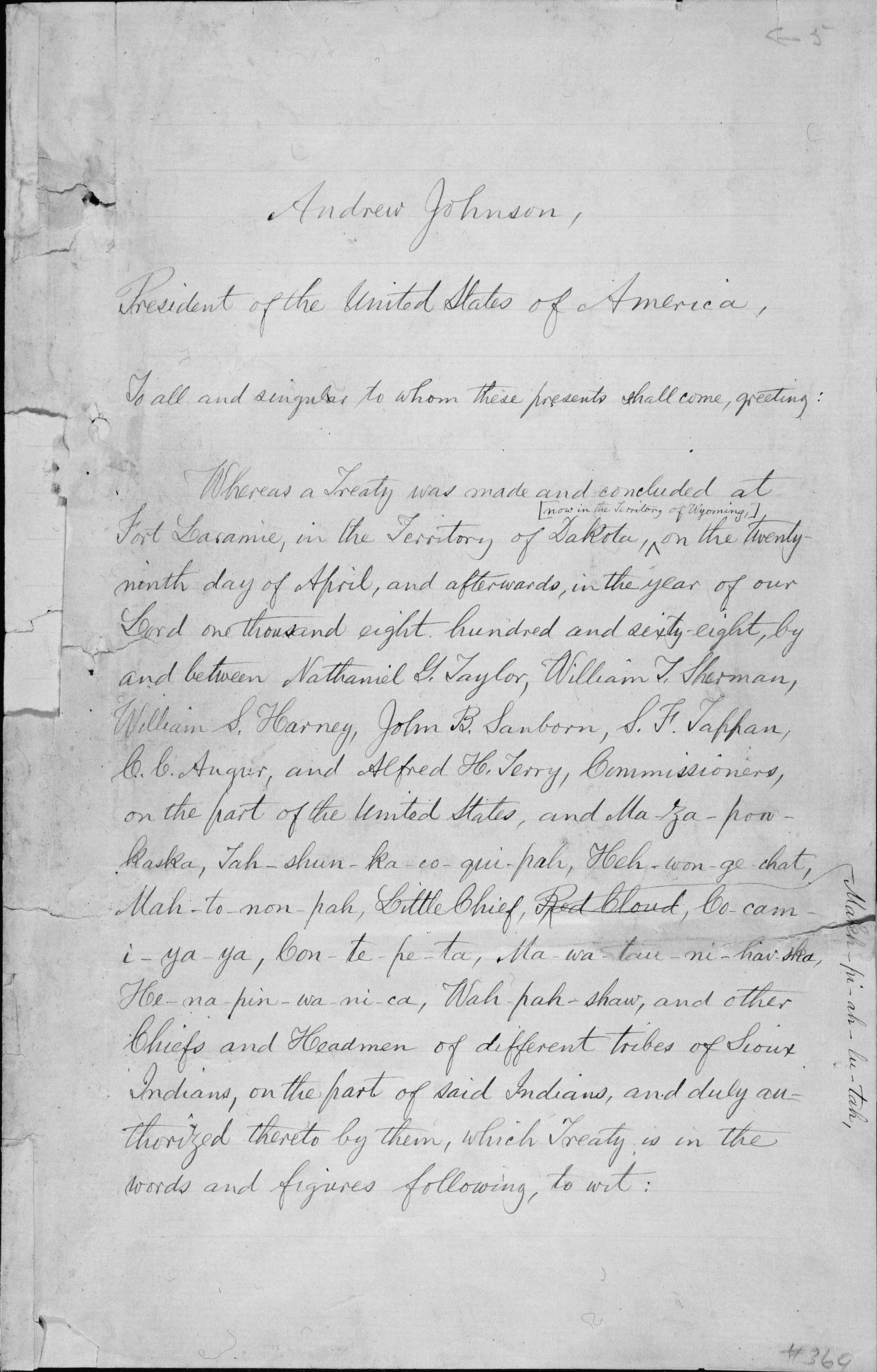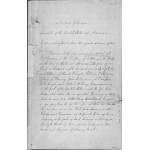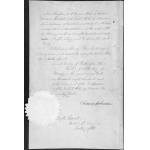President Andrew Johnson's Ratification of the Fort Laramie Treaty
2/24/1869
Add to Favorites:
Add all page(s) of this document to activity:

Add only page 1 to activity:
Add only page 2 to activity:
In this proclamation, President Andrew Johnson announces the ratification and confirmation of the Fort Laramie Treaty. He lists the principal negotiators of the agreement, including William T. Sherman, representing the United States.
In 1868, the Federal Government had established the Indian Peace Commission. Under the Commission, Sherman and his staff negotiated a peace treaty with the Sioux (Brule, Oglala, Miniconjou, Yanktonai, Hunkpapa, Blackfeet, Cuthead, Two Kettle, Sans Arcs, and Santee) and the Arapaho. All the tribes involved gave up many thousands of acres of land that had been promised in earlier treaties, but retained hunting and fishing rights in their older territory. They also agreed not to attack railroads or settlers. In exchange, the U.S. Government established a smaller reservation than before, consisting of a large portion of the western half of what is now the state of South Dakota, including the Black Hills.
After the Revolutionary War, the United States had continued the European practice of negotiating treaties with the Native Peoples similarly to how they negotiated with foreign governments. This practice changed gradually over time. In 1831, the Supreme Court case Cherokee Nation v. Georgia changed the status of Native tribes from "independent, sovereign nations" to "domestic dependent nations." Treaties, however, still followed the pattern of requiring negotiations between the U.S. Government and tribal governments — ratification by Congress, the step seen in this document.
In 1868, the Federal Government had established the Indian Peace Commission. Under the Commission, Sherman and his staff negotiated a peace treaty with the Sioux (Brule, Oglala, Miniconjou, Yanktonai, Hunkpapa, Blackfeet, Cuthead, Two Kettle, Sans Arcs, and Santee) and the Arapaho. All the tribes involved gave up many thousands of acres of land that had been promised in earlier treaties, but retained hunting and fishing rights in their older territory. They also agreed not to attack railroads or settlers. In exchange, the U.S. Government established a smaller reservation than before, consisting of a large portion of the western half of what is now the state of South Dakota, including the Black Hills.
After the Revolutionary War, the United States had continued the European practice of negotiating treaties with the Native Peoples similarly to how they negotiated with foreign governments. This practice changed gradually over time. In 1831, the Supreme Court case Cherokee Nation v. Georgia changed the status of Native tribes from "independent, sovereign nations" to "domestic dependent nations." Treaties, however, still followed the pattern of requiring negotiations between the U.S. Government and tribal governments — ratification by Congress, the step seen in this document.
Transcript
[top right] [arrow pointing left] 5Andrew Johnson,
President of the United States of America,
To all and singular to whom these presents shall come, greeting:
Whereas a treaty was made and concluded at Fort Laramie, in the Territory of Dakota, ^ [now in the Territory of Wyoming], on the twenty-ninth day of April, and afterwards, in the year of our Lord one thousand eight hundred and sixty-eight, by and between Nathaniel S. Taylor, Willian L. Sherman, William S. Harney, John B. Sanborn, S.F. Sappan, C.C. Auguir, and Alfred H. Terry, Commissioners, on the part of the United States, and Ma-za-pon-kaska, Tah-shun-ka-co-qui-pak, Heh-won-ge-chatm Mah-to-non-pal, Little Chief, Red Cloud ^ Makh-pi-ah-lu-tah, Co-cam-i-ya-ya, Con-te –pe-ta, Ma wa tau ni-hau-ha, He-na-pin-wa-ni-ca, Wah pah-shaw, and other Chiefs and Headmen of different tribes of Sioux Indians, on the part of said Indians, and duly authorized thereto by them, which Treaty is in the words and figures following, to wit:
#369
Now, therefore be it known that I, Andrew Johnson, President of the United States of America, do in pursuance of the advice and consent of the Senate, as expressed in its resolution of the sixteenth of February, one thousand eight hundred and sixty nine, accept, ratify, and confirm in the said Treaty. In testimony whereof I have hereto signed my name, and caused the seal of the United States to be hereto affixed.
Done at the city of Washington this twenty fourth day of February, in the year of our Lord one thousand eight hundred and sixty nine, and of the Independence of the United States of America the ninety third.
Andrew Johnson
[seal on lower left side of page]
By the President:
William H Seward
Secretary of State.
This primary source comes from the General Records of the United States Government.
National Archives Identifier: 299799
Full Citation: President Andrew Johnson's Proclamation Regarding Treaty with the Sioux at Fort Laramie; 2/24/1869; Indian Treaties, 1722 - 1869; General Records of the United States Government, Record Group 11; National Archives Building, Washington, DC. [Online Version, https://www.docsteach.org/documents/document/fort-laramie-treaty-ratification, April 25, 2024]Rights: Public Domain, Free of Known Copyright Restrictions. Learn more on our privacy and legal page.





